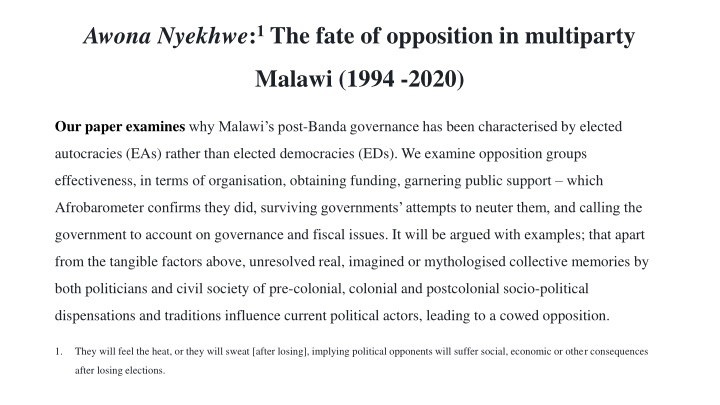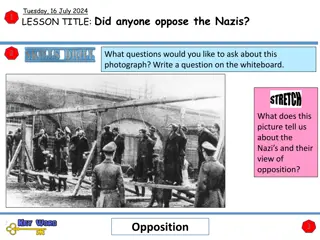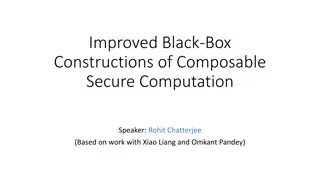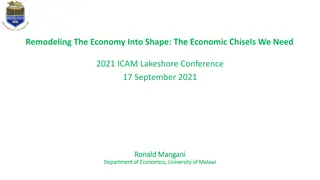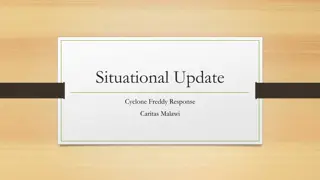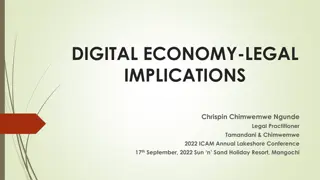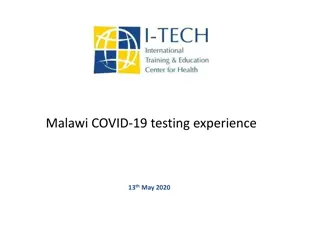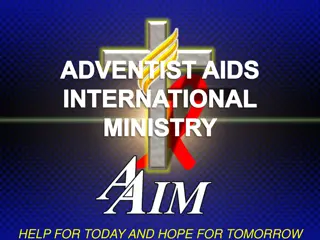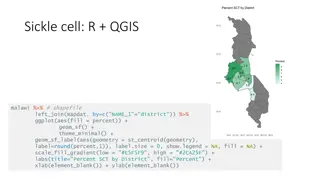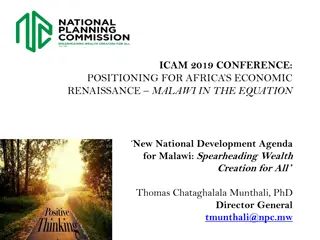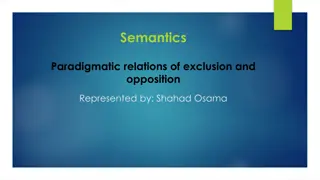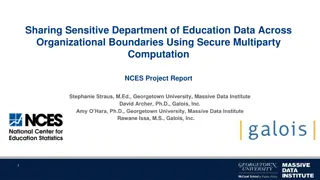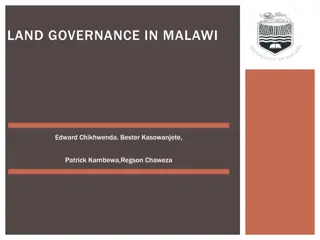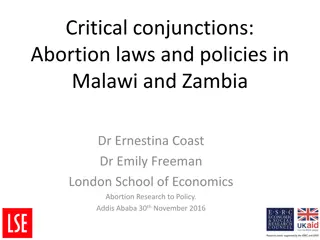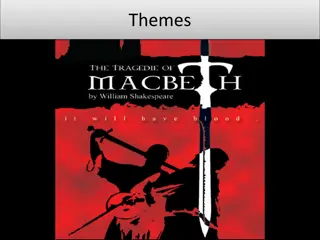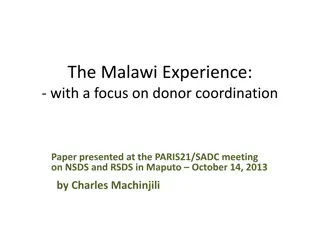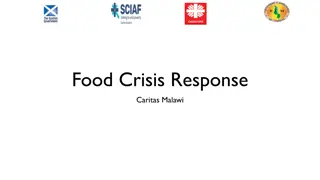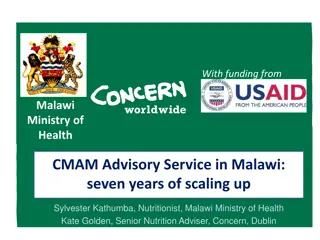The Fate of Opposition in Multiparty Malawi: 1994-2020
This paper explores why Malawi's governance post-Banda has been dominated by elected autocracies rather than democracies. It delves into the effectiveness of opposition groups in terms of organization, funding, public support, and resilience against government attempts to suppress them. The influence of historical socio-political memories on contemporary political actors is also highlighted, impacting the opposition's ability to challenge the government. Structural factors like the role of money in politics are identified as critical obstacles to fostering participatory democracy in Malawi.
Download Presentation

Please find below an Image/Link to download the presentation.
The content on the website is provided AS IS for your information and personal use only. It may not be sold, licensed, or shared on other websites without obtaining consent from the author.If you encounter any issues during the download, it is possible that the publisher has removed the file from their server.
You are allowed to download the files provided on this website for personal or commercial use, subject to the condition that they are used lawfully. All files are the property of their respective owners.
The content on the website is provided AS IS for your information and personal use only. It may not be sold, licensed, or shared on other websites without obtaining consent from the author.
E N D
Presentation Transcript
Awona Nyekhwe:1The fate of opposition in multiparty Malawi (1994 -2020) Our paper examines why Malawi s post-Banda governance has been characterised by elected autocracies (EAs) rather than elected democracies (EDs). We examine opposition groups effectiveness, in terms of organisation, obtaining funding, garnering public support which Afrobarometer confirms they did, surviving governments attempts to neuter them, and calling the government to account on governance and fiscal issues. It will be argued with examples; that apart from the tangible factors above, unresolved real, imagined or mythologised collective memories by both politicians and civil society of pre-colonial, colonial and postcolonial socio-political dispensations and traditions influence current political actors, leading to a cowed opposition. 1. They will feel the heat, or they will sweat [after losing], implying political opponents will suffer social, economic or other consequences after losing elections.
Theoretical considerations: A: The Western/donor viewpoint: Svasand [acknowledges the role of non-party actors] but uses Dahl s concept that in a democracy the concept [of opposition] usually refers to the role of political parties. 2 This definition is too restrictive for Malawi and favours those who view the legitimacy of economic, social and political voices as being restricted to institutionalised and authorised parties. (Lars Sv sand, Lars Sv sand, The Concept of Opposition and the Structure of Opposition in Malawi , Commonwealth & Comparative Politics, No. 51, Vol. 3, 2013, p 307.) We prefer: the notion of opposition should be understood as a stance of disagreement expressed in the public sphere by mobilized actors, through different modes of action, the target of discontent being the government or its policies, the political elite, or the political regime as a whole (Brack & Weinblum, 2011, p 76). (Brack, Nathalie and Weinblum, Sharon, 2011 Political Opposition : Towards a Renewed Research Agenda Interdisciplinary Political Studies Vol.1, No. 1). 2. Lars Sv sand, The Concept of Opposition and the Structure of Opposition in Malawi , p 307.
Theoretical considerations (cont.): B: Structural versus Agency versus Culture (political and other) Structural argument: John Lwanda (2006) Kwacha: The Violence of Money in Malawi's Politics, 1954 2004, Journal of Southern African Studies Vol. 32, No. 3 (Sep., 2006), pp. 525-544 One of the strongest limiting factors in the transition to participatory democracy in Malawi is the failure of independent and sustainable cadres of young politicians to emerge. This is caused by the role that money, generated via the informal economy, plays in Malawian politics. This money is channelled into politics via achikulire (neo-patrimonial patrons or big men ), usually without party accountability. This factor may be more critical in retarding the development of participatory democracy than social structure, ethnicity, religion, donors or other aspects of political dynamics. [ some of the disorder in Africa observed by Chabal and Daloz (1999) is actually a function of the unresolved historical dynamic between two economic sectors: the formal cash (colonial European and postcolonial black elite) sector and the informal non-cash (rural/peasantry) sector. By controlling this dynamic, neo-patrimonial politicians can minimise ethnic, social, political and constitutional barriers to their hold on power. The Government was and remains the major source of business and patronage in Malawi . (Hooper JE. "The politics of patronage" MA thesis, Centre for Southern African Studies, York University 1984)
Agency: Civil society as active political agents. Tengatenga s politically active civil society remains a difficult concept subject to state restrictions. (Tengatenga, James. Church, State and Society in Malawi: An Analysis of Anglican ecclesiology, Kachere: Zomba, 2006, p 20.) Can be influenced by: Cultural Incumbency Religious Funding Personal Judiciary Ideological Personalities Ethnicities Development partners Civil Society Education Class (Academic Freedom debate, Diesel Petrol Palibe) versus valium of AIP , state capture) Et cetera
On culture: Not always a deterministic factor. Marwick reports harsh punishment which kept out, inter alia, theft, adultery and disobedience at a minimum in the name of maintaining harmony among the Chewa. (Marwick, M.G., 1965. Sorcery in its Social Setting. A Study of the Northern Rhodesian Cewa. Manchester: Manchester University University Press, page 247). In pre-colonial times, people could be banished from villages or chiefly administrations for dissent. Mazrui argued that cultural factors do play in politics, politicians being part of the society. He stated that culture provides lenses for perception and cognition, motives for human behaviour, criteria of evaluation, a basis for an identity, a mode of communication, a basis for stratification and the system of production and consumption (Mazrui, A. 1990: Cultural Forces in World Politics. Oxford: James Currey, page 7-8). The same Mazrui saw He also argued that oral traditions [as] transmitting from generation to generation, mainly what is accepted and respected. It does not transmit heresies of the previous age Oral tradition is a tradition of conformity, rather than heresy, a transmission of consensus rather than dissidence (Mazrui (1990: 140). So: harsh punishments accidentalizations wina alira awona nyekhwe Chilembwe as hero but loser .
Consequence As Pascal Kishindo observes: ndale is Chichewa for politics [originally it had] no political connotations. [The original meaning of] ndale was a mode of wrestling in which one [trips and] overthrows the other, [ ] tripping [here is called] kupinga/kutchera. Kupinga/kutchera ndale, then, is to throw an obstacle in the path that your fellow may stumble Politics is concerned with the winning and holding of government power winning political power entails not only that one s opponent stumbles , but better still, disappears from the field of play completely. [ ] to engage in politics is regarded as an instrument of settling scores and punishing those that hold opposing views. (Pascal Kishindo, Evolution of Political Terminology in Chichewa and the Changing Political Culture in Malawi Nordic Journal of African Studies, Vol. 9, No. 1 (2000), 23.) Losers (otsutsa) became zigawenga (rebels) [classed as beasts, zirombo] Leading to Weak political agency as both organisations and individuals succumb to above considerations, some by being captured and others by being economically handicapped.
